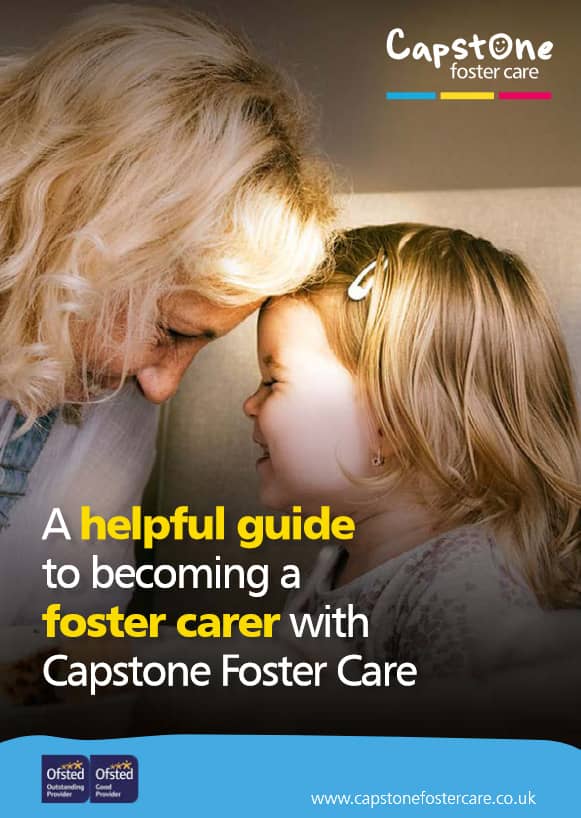


Fostering a disabled child
The role of an independent fostering agency
How to choose a foster care agency
Can I choose who I foster?
What are the benefits of fostering with an independent fostering agency?
What happens when a child is taken into care?
Fostering process: what happens on an initial home visit?
Fostering with local authority vs independent agency
A complete guide to becoming a foster carer
How Are Children in Foster Care Matched with Carers?
Foster Care Budgeting Tips
Becoming A Foster Carer
What is a Care Leaver?
What is a Foster Carer?
Fostering Regulations
How long does it take to become a Foster Carer?
What are the Foster Care requirements?
Changing IFA - Transferring to Capstone
8 reasons why a child may be taken into care
Fostering as a Career
Can you foster if you smoke or vape?
A guide to fostering assessments
LGBTQ+ Fostering
Equality, Inclusion & Anti-discriminatory Practice in Foster Care
What can disqualify you from foster care?
Can you foster if you’re on benefits?
Top transferable job skills to become a foster carer
Fostering as a same sex couple
Fostering while renting
Can you foster if you have mental health issues?
Is there an age limit for fostering in the UK?
Do foster carers get a pension?
How to foster a child: A step by step guide
How do DBS Checks Work?
Can I foster if...?
Mythbusting the top 10 Foster Care Myths
Can I foster if I am disabled?
LGBT Fostering Mythbusting
Can I foster if I have pets?
Can I Foster A Child?
Can I Foster and Work?
Can you Foster with a Criminal Record
Can Single People Foster?
LGBT Family and Foster Care
Fostering across Cultures
Muslim Fostering
Christian Foster Care
Sikh Fostering
Empty Nest Syndrome and Foster Care
Can I Foster?
What is the difference between residential care and foster care?
Fostering Babies and Young Children
What is Kinship Care?
Fostering Babies - Myths
Focusing on Parent & Child Fostering
Fostering Siblings
Fostering Teenagers
Fostering Teenagers - Breaking down the Myths
Fostering Unaccompanied and Asylum Seeking Children
Mother and Baby Foster Placements
Private Fostering
How does therapeutic fostering work?
Young Children Fostering Placements
Difference between short and long-term fostering
Types of self-harm
A Guide to the Foster Care Handbook
Reunification and Birth Parents: A Guide for Foster Carers
What is an EHC Plan? A Guide for Foster Carers
How to prepare a child for becoming a care leaver
Children who foster: impact of fostering on birth children
Fostering LGBTQ+ Youth
How to prepare your home for a foster child
How to help a lonely child: A Guide for Foster Carers
What are the National Minimum Standards for Fostering Services?
10 tips for foster children's education
How to prepare your foster child for secondary school
Tips for coping when foster placements end
Tips for foster parents during Coronavirus
What happens if foster parents get divorced?
5 ways to manage Mother's Day with foster children
Tips for managing foster children's bedtime routines
How to handle foster child bullying
Fostering allowances and the gender pay gap
What discounts can foster carers get?
How to adopt from Foster Care
5 ways to manage Father's Day for children in foster care
8 most common fostering challenges
FosterTalk Membership with Capstone Foster Care
Supporting foster children's contact with birth families
A guide to independent fostering
Keeping Children Safe Online: A Guide For Foster Carers
Movies About Foster Care
Play-based learning strategies for foster carers
A Guide to the Staying Put Program
Why Foster Parent Wellbeing Matters
How to deal with empty nest syndrome
How to recognise signs of depression in foster children
Can you take a foster child on holiday?
Tips and advice on fostering with a disability
10 tips on connecting with your Foster Child
Fostering vs Adoption - What's the difference?
How Fostering can change a future
How to adopt from Foster Care
How to encourage children to read in Foster Care
How to prepare a Foster Child's bedroom
Reading and Storytelling with Babies and Young Children
Supporting Children's Learning
The 20 most recommended books Foster Carers and young people should read
Things you can do when your children leave home
The impact of early childhood traumas on adolescence and adulthood
Anxious Disorders in Foster Children
What is sexual abuse and sexual violence
Foster Child behaviour management strategies
Foster Parent Advice: What to expect in your first year of fostering
Capstone's twelve tips at Christmas
10 celebrities who grew up in Foster Care
Could Millenials be the solution to the Foster Care crisis?
Do you work in Emergency Services?
Form F Assessor and Assessment Training
Foster Care Fortnight
Improving Children's Welfare - Celebrating Universal Children's Day
New Year - New Career - Become a Foster Carer
Young People Charities
If you're considering fostering but you have a disability, don't let this put you off – fostering with a disability is certainly possible. That's why we’ve put together this guide with tips for foster parents with a disability from interview with visually impaired carer, Marcus. Learn how to become a foster carer with a disability, and realistically how much this will impact your foster care career.
One of our Midlands carers, Marcus Pinnock, has shared his fostering story with us in order to provide advice and tips on fostering with a disability for other potential carers.
Marcus retired from his position in Sales at the age of 50 due a visual impairment diagnosis, Retinitis Pigmentosa, in 2006. “I began to explore my options as I knew I wanted to do more with my time and still felt like I could give back to the community, despite my condition. My sister was a foster carer and adoption was something that had been done in my extended family. I wanted to find out whether this was something I could also do.”
Marcus found fostering as an option – and began his assessment process with his partner Debbie which lasted 6 months. Regarding having a disability and considering fostering as a career, Marcus said:
“I considered whether my condition would make a difference to whether I could foster or not. However, I realised that if I had had my own young birth children at home, I would have naturally have had to adapt to provide care for them – so why not apply the same principle to taking care of children and young people who are in need of a loving and caring home.”
Marcus explained that there are some elements of his visual impairment which make fostering more difficult, such as being careful with toys being on the floor and ensuring that he uses public transport and taxis to attend meetings and health appointments. “You have to learn to adapt, and Debbie and I are more than able to provide for a child – regardless of a disability.”
Marcus and his partner Debbie began their fostering journey in March 2017 so have been fostering with Capstone Foster Care for over 3 years – having multiple foster placements during that time including short term fostering, emergency fostering, long term fostering and respite foster care.
“We are motivated to encourage our little boy that we care for to try and experience new things and since being with us, he has been to the beach for the first time, been to Go Ape, and visited The Cotswolds as well as other destinations on holiday. He is developing positive relationships, enjoying school and the time together that they have with wider family members.
I am over the moon with fostering and my only regret is that I didn’t start my fostering journey 5 or 6 years earlier. Even if I was not visually impaired, this is still the most rewarding job I have ever done.”
If you are wondering if you can foster if you’re disabled, our informative guide on both fostering with a disability, and fostering a child with a disability, has you covered. If you want to speak to one of our experts to gain more advice about disability fostering, get in touch today.
If you’ve got any questions or would like to find out more about fostering with Capstone, fill out the form below.
An experienced fostering advisor from your local area will then be in touch.

Start the conversation today. Our team of friendly advisors are on hand to answer any foster care questions you may have. We can offer you honest and practical advice that can help you decide if becoming a foster carer is the right path for you.


